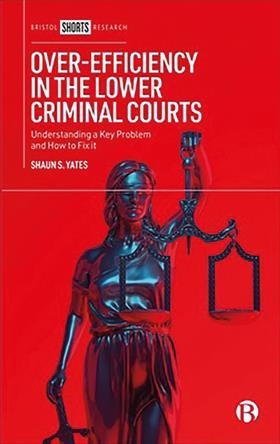Over-Efficiency in the Lower Criminal Courts: Understanding a Key Problem and How to Fix it
Shaun S Yates
£45, Bristol University Press
★★★✩✩
Many of those involved in the court system recognise that there are inefficiencies that must be resolved. The central message of this book is that the policy of seeking efficiency – which has usually meant spending cuts – has gone too far, resulting in injustice. The author analyses research into the workings of the court system and offers suggestions for improvement.
The book is based on studies carried out at one court over 66 days’ sittings across six months. Researchers were sent to sit in court and observe and note conservations between the key players in courtroom dramas.
It starts with an analysis of the recent history of criminal courts policy from the New Labour government of the late 1990s and its focus on being tough on crime and its causes. This policy aimed to deliver social justice and efficiencies, and introduced many changes to the criminal law. That era was followed by the 2008 global financial crisis, austerity under the Conservative/Liberal-Democrat coalition, the ‘Big Society’ and ‘doing more with less’. Efficiencies in the form of budget cuts were made by closing local courts, and reducing legal aid scope and eligibility. Then came the pandemic, which left us with a failing court system and overcrowded prisons.

These policies were all different ways of reducing money spent on courts. It is easy to see how ‘over-efficiencies’ can be false economies and lead to injustice. There are economic consequences of innocent people being convicted. Prisoners do not work, pay taxes or provide for their families.
The book focuses on various problems including defendants with mental health and addiction issues. It identifies the courts’ reluctance to accept that some defendants have mental health problems and use drugs. Such criticisms highlight a need for more training and resources.
The author also reflects on the negative effects of closing local courts – one being that professionals, witnesses and parties have to travel – but also questions the place of ‘procedural adversity’, which presumably means the state funding prosecuting and defence lawyers. The book also questions the increasing role of district judges in encouraging ‘realistic’ pleas.
The author’s other suggestions include that magistrates should not let their courts’ legal advisers deal with issues in their absence; prosecutors should challenge points relied on in mitigation; and participants in remote hearings should not be muted. The overall theme is that sometimes being slow is better.
Perhaps this book could say more about the effects of the pandemic, which forced the government to invest in technology that has advantages in efficiency and is likely now underused. There is also little on how the government pays lawyers and whether the legal aid system rewards efficiency. Another increasingly important issue is the difficulty of recruiting defence lawyers.
This thought-provoking study of an important issue offers challenging suggestions for reform that not everyone will accept.
David Pickup is a partner at Pickup & Scott Solicitors, Aylesbury































No comments yet